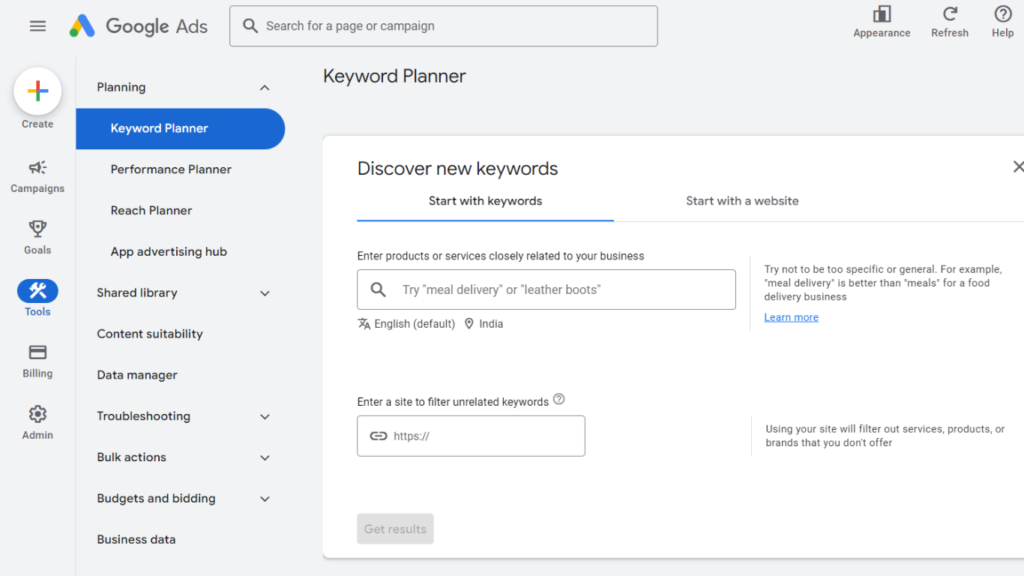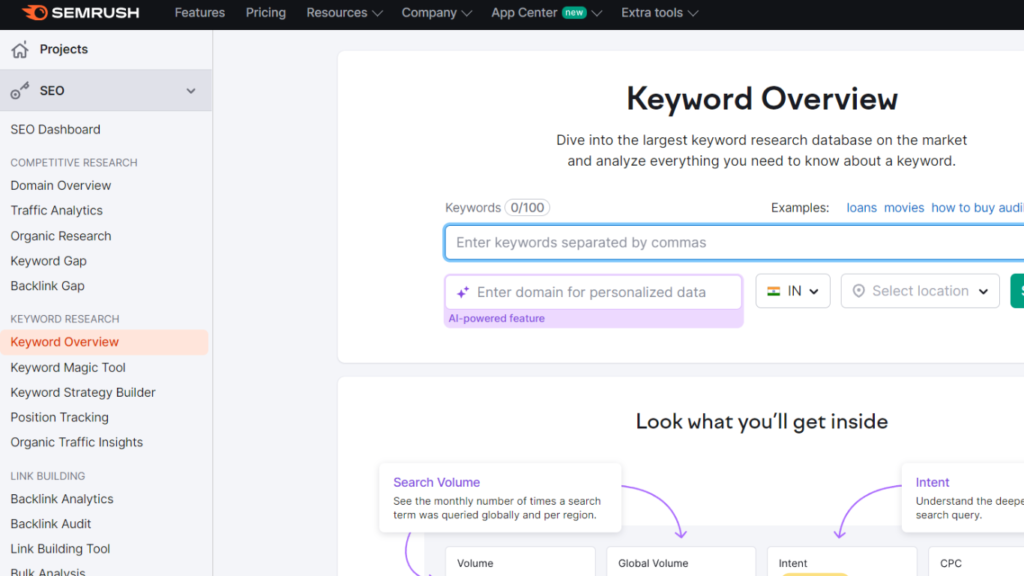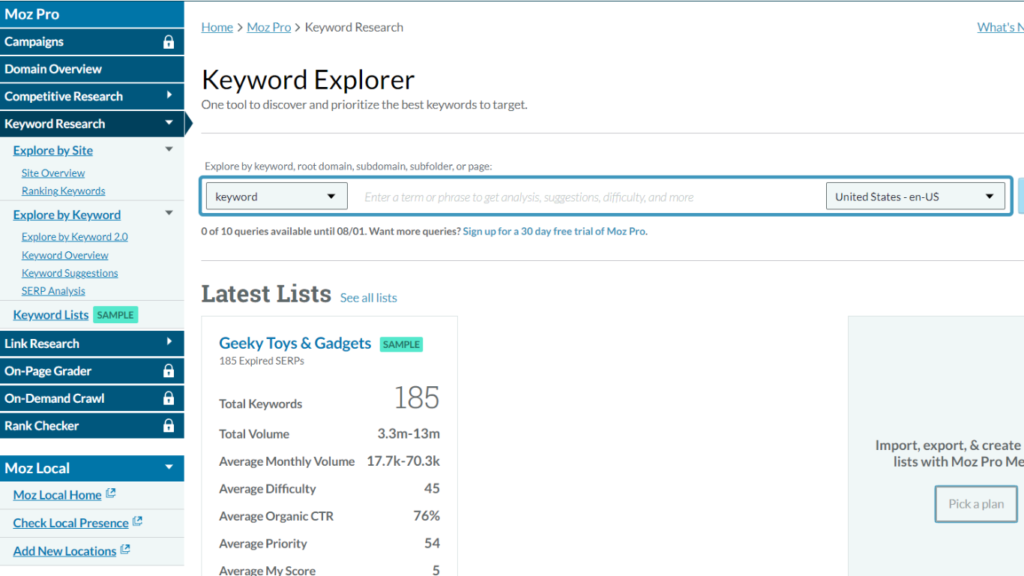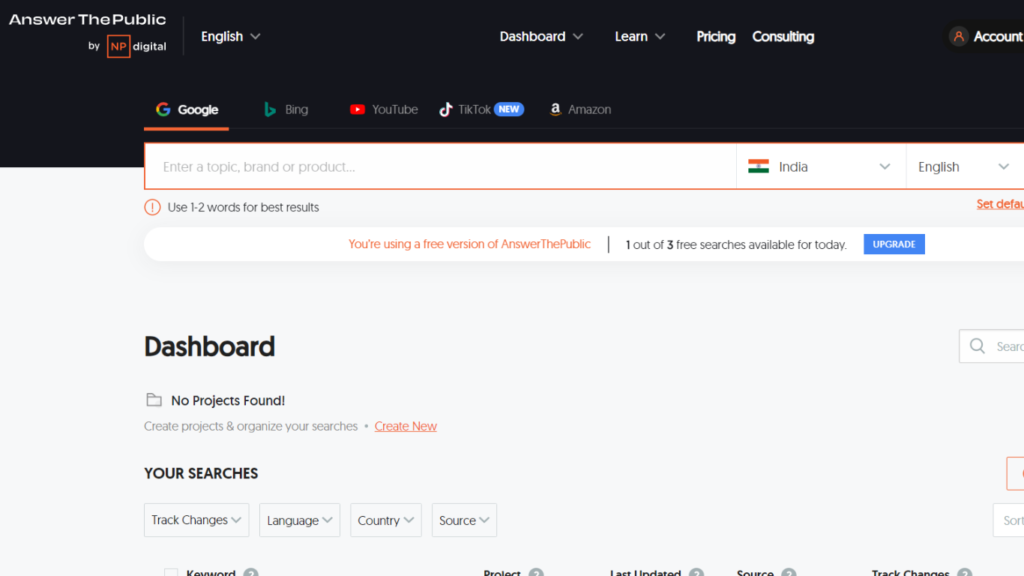To increase organic traffic to your website in the digital sphere, you must know which keywords to target. The link between what people are looking for and the content you offer is created by keywords. Your website’s exposure and relevancy will increase if you target the proper keywords and draw in users who are actively looking for the products or information you offer.
Throughout this process, the Keyword Research Tool is a priceless resource since it provides information on search trends and keyword performance. By using this tool, you may improve your content strategy, find overlooked possibilities, and eventually raise your search engine results. This post will show you how to use this tool to raise your search engine rankings.
What is Keyword Research?
A keyword is an essential part of the modern online and search engine environment. Keywords are the terms or phrases on a website that Search Engine Optimizers (SEO) use to find and show information related to a search. The website would not be able to reach a variety of customers if the keywords were not used correctly.
Finding the right keywords for your company and using them on your website, in articles, blogs, and social media posts will help you expand your reach. This post will teach you all there is to know about keyword research tools. Let’s look at a few of the tools that many content writers vouch for.
Why Keyword Research is Important?
Since keyword research helps you match your content to the intent of the user, it is essential for successful SEO and digital marketing. You may improve engagement and relevancy by producing content that directly addresses consumers’ requirements by finding out what they are searching for. Additionally, using chosen keywords improves the visibility and search ranks of your website, which increases organic traffic.
Additionally, by addressing new issues and gaps, it helps you keep ahead of the competition by pointing out industry trends and possibilities. By concentrating on the most profitable terms, keyword research maximizes return on investment for paid advertising by optimizing ad spend.
It also directs your content strategy, making sure you cover important subjects and draw in a more focused audience. In general, keyword research improves user experience by providing content that better engages users and encourages conversions.
What are Keyword Research Tools?
Keyword research tools are software platforms that help you discover and analyse keywords for SEO purposes.
Finding the terms or phrases that people enter into search engines is crucial for creating any kind of content marketing or SEO strategy. Additionally, you must comprehend the information that these keywords represent, such as:
- Monthly search volume
- Potential traffic of the keyword
- Keyword difficulty and more.
You can use this information to inform your content strategy by using the appropriate keyword research tools. You wouldn’t know what keywords to target in your website content if you didn’t have access to keyword research tools.
Furthermore, you wouldn’t be able to identify profitable keyword prospects or understand how to optimize your blog entries and web pages for particular keywords. This would significantly reduce your SEO effectiveness.
6 Best Keyword Research Tools in 2024
Finding the best tool for your goals and budget is now possible that you are aware of the applications for keyword research tools. Here are a few of the top tools for keyword research that you may find useful.
1. Google Keyword Planner
One free tool in Google Ads that offers helpful information for keyword research is Google Keyword Planner.

Image Source : Google Keyword Planner
Features:
- Keyword Ideas: Produces keyword recommendations based on the content of your website or entered phrases.
- Search Volume: Displays the typical monthly quantity of queries for every keyword.
- Competition: A measure of a keyword’s level of ad placement competition.
- Bid Estimates: Estimates the cost of a click for campaigns using paid search.
Best For: Basic keyword research, particularly useful if you’re running PPC campaigns or just starting with keyword planning.
2. Ahrefs
A complete suite of SEO tools, Ahrefs is renowned for its potent keyword research tools.

Image Source : Ahrefs
Features:
- Keyword Suggestions: Provides keyword suggestions together with data on search volume, clicks, and difficulty.
- Keyword Difficulty: Calculates the difficulty of ranking for a keyword in light of the competition at the moment.
- Competitor Analysis: This gives you access to the backlink profiles and keywords that your rivals are ranking for.
- SERP Overview: Gives a summary of a keyword’s current search engine results page.
Best For: In-depth SEO analysis and competitive research. Ideal for understanding keyword difficulty and finding opportunities.
3. SEMrush
SEMrush is a comprehensive digital marketing tool that offers extensive keyword research capabilities.

Image Source : SEMrush
Features:
- Keyword Suggestions: Identifies potential keywords and provides search volume and difficulty ratings.
- Competitor Analysis: Reveals the keywords and methods used by rivals to rank.
- Keyword Trends: Provide information on seasonal fluctuations and keyword patterns.
- SERP Analysis: Provides thorough SERP analysis, encompassing metrics and top-ranking pages.
Best For: Comprehensive keyword research and competitive analysis. Excellent for developing a detailed SEO strategy.
4. Moz Keyword Explorer
Moz Keyword Explorer is an SEO insights and keyword research tool.

Image Source :Moz Keyword Explorer
Features:
- Keyword Suggestions: Offers metrics like search volume and difficulty as well as keyword ideas.
- Keyword Difficulty: Scores the difficulty of ranking for a particular keyword.
- SERP Analysis: Evaluates a keyword’s search engine results page in order to assess competition.
- Opportunity Metrics: Provides information on possible traffic and click-through rates.
Best For: Discovering new keywords and understanding the difficulty of ranking for them. Useful for keyword discovery and optimization.
5. Ubersuggest
Ubersuggest is a budget-friendly tool that provides keyword research and content ideas.

Image Source : Ubersuggest
Features:
- Keyword Suggestions: Generates suggestions for keywords by using seed keywords.
- Search Volume: Displays the typical monthly number of keyword searches.
- SEO Difficulty: A measure of a keyword’s difficulty in ranking.
- Content Ideas: Provides ideas for articles based on trending keywords.
Best For: Cost-effective keyword research and content ideation. Ideal for small businesses or individuals on a budget.
6. Answer the Public
Answer the Public displays potential keywords based on frequently asked queries and search terms.

Image Source : Answer the Public
Features:
- Question-Based Keywords: Provides keyword recommendations based on frequently asked queries.
- Visualization: Data is presented visually, making subjects and keyword clusters easy to see.
- Prepositions and Comparisons: Utilizes prepositions and comparisons to generate keywords.
Best For: Identifying keywords according to search intents and user queries. Excellent for comprehending user inquiries and generating content ideas.
Key Steps to Keyword Research
Define Goals and Audience
Determine the goals you have for your keyword research and gain insight into the characteristics and search queries of your target audience.
Use Keyword Research Tools
Make use of resources such as Google Keyword Planner or SEMrush to produce keyword ideas and collect information on search traffic and competition.
Analyze Metrics
Examine important variables, including search volume (the number of times a term is searched), Keyword Difficulty (the difficulty of ranking for a keyword), and competition level (the number of people targeting the keyword).
Identify Long-Tail Keywords
Look for longer, more precise terms that draw in more targeted traffic and are less competitive.
Incorporate Keywords
Incorporate targeted keywords into the content of your website and PPC advertising to increase search engine visibility and relevancy.
Conclusion
Improving search ranks requires good use of Keyword Research Tools. Establish specific objectives and comprehend your target audience first. Make use of resources to find profitable keywords and examine metrics such as search volume and competitiveness. For focused traffic, concentrate on long-tail keywords and use them in your marketing and content. Keep an eye on your plan and make any adjustments to keep current with search engine trends and improve your internet presence.

